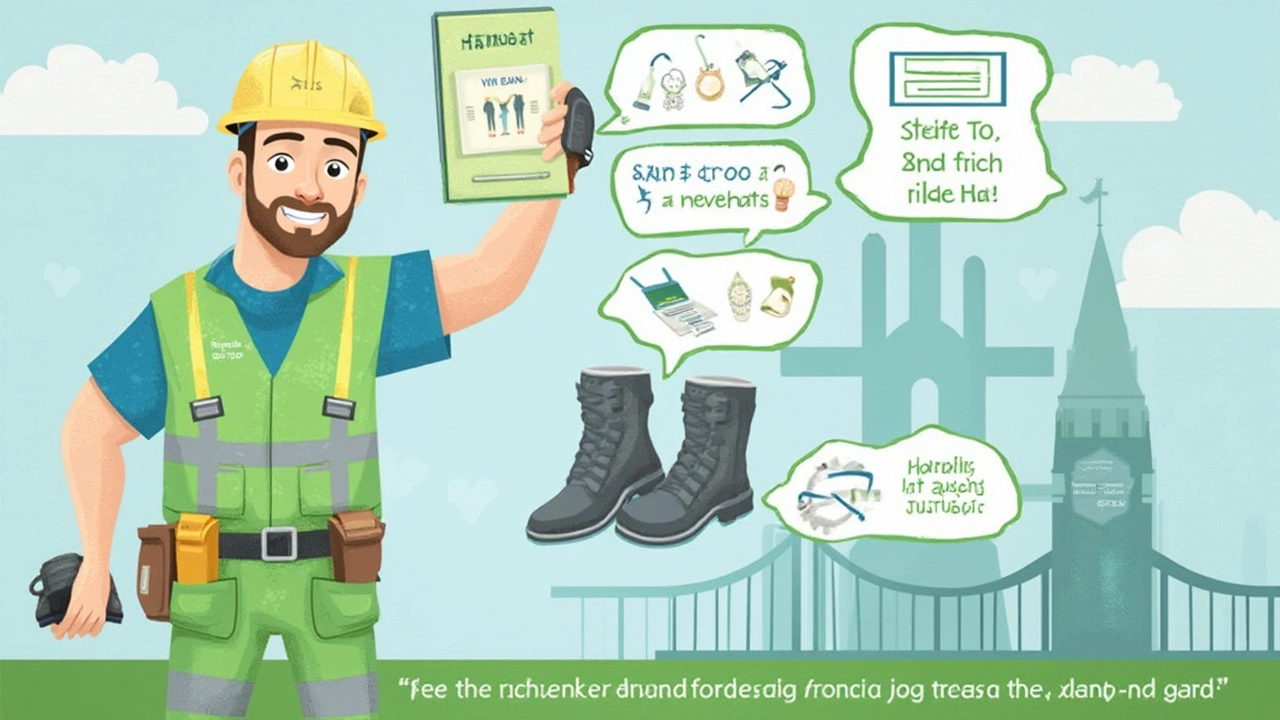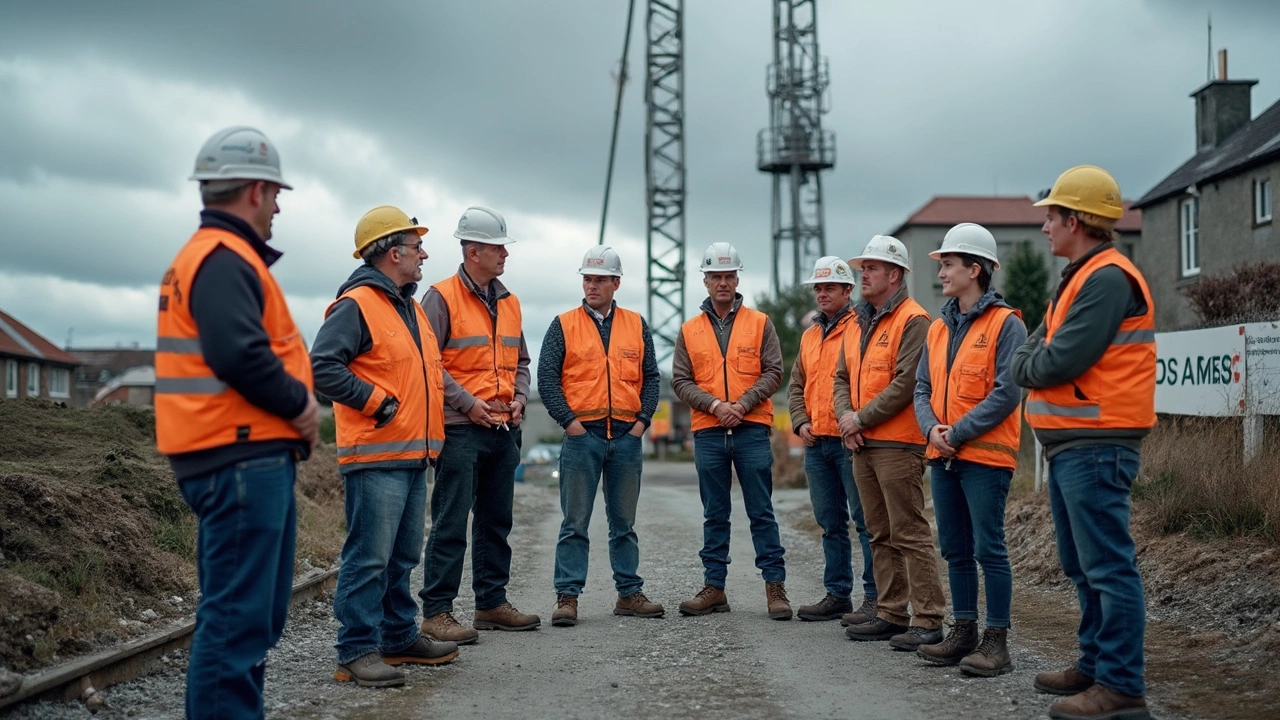If you're working construction in Galway, managing stock in a Dublin warehouse, or helping out on a farm in Mayo, chances are someone’s told you to wear steel-toe shoes. But can a company in Ireland really force you to wear them every shift?
Irish workplaces are, for the most part, pretty strict about safety gear. The Health and Safety Authority (HSA) doesn’t mess around—if there’s even a small chance something heavy could land on your foot, your boss is likely required by law to make you wear protective footwear. It’s not just a suggestion. Under the Safety, Health and Welfare at Work (General Application) Regulations, employers must make sure staff have Personal Protective Equipment (PPE) when it’s needed, and that includes steel-toe boots or shoes in risky places.
But here’s the thing: it’s not about making your life miserable. It comes down to liability and your well-being. No employer in the Irish market wants to risk a huge fine or worse, a serious injury claim. They have a legal duty to keep you safe, which means you can't really just say no if there’s a genuine hazard. That said, any demand for steel-toe shoes needs to be backed up with a real safety reason, not just ‘because the boss said so’.
- What Irish Law Says About Work Shoes
- When Are Steel-Toe Shoes a Must?
- Your Rights and Your Employer's Duties
- How to Get Shoes That Actually Fit
- Common Questions Workers Ask
What Irish Law Says About Work Shoes
If you’ve ever filled in training forms at work or spotted a HSA inspector strolling around your site, you know Ireland takes workplace safety seriously. The rules about protective footwear come mainly from the Safety, Health and Welfare at Work Act 2005, plus the specific General Application Regulations 2007. These set out what gear workers must wear and what employers are supposed to provide.
The Health and Safety Authority (HSA) is the government body that checks if businesses are following the rules. Their inspectors can show up anywhere—from factories in Louth to small carpentry workshops in Kilkenny—to make sure the right personal protective equipment is being used. If you’d get in trouble for dropping something heavy on your foot, they’ll expect to see you wearing steel-toe shoes or boots.
For jobs like building, loading, plumbing, and even certain gigs in hospitality or healthcare (think: people working in kitchens with big pots), employers must do a risk assessment. If there’s any real risk, the employer has to provide suitable work shoes for free. And, by law, those shoes must actually fit and be reasonably comfortable—not just any old pair from the back room. The HSA even says companies need to keep up with maintenance, so if your boots start falling apart, you should get new ones at no cost to you.
Here’s what the law boils down to in Ireland:
- If a job has real dangers for your feet, safety shoes are a must.
- Your employer must supply and pay for the proper work footwear, after checking the risks.
- If your steel-toe boots are damaged or uncomfortable, you have the right to ask for a replacement.
No one is supposed to cut corners. If your workplace skips out on this, you can ring the HSA or check Citizens Information for what to do next. Safety laws aren’t just paperwork—they’re there to keep you on your feet and out of hospital.
When Are Steel-Toe Shoes a Must?
In Ireland, it’s not just about following the crowd—there are clear, specific situations where steel-toe shoes are a must. This isn’t just personal preference or some old-fashioned rule; it’s written right into Irish safety law. Safety footwear becomes essential when there’s a risk of foot injury, and that risk is more common than you might think.
Here’s where you’ll almost always need steel-toe shoes:
- On construction sites—think big projects in places like Dublin’s Docklands or the M7 works near Naas.
- Warehouses or distribution centres, especially where forklifts and pallets are common (big spots like Musgrave’s or BWG).
- Factories and food processing plants—especially if there’s heavy machinery, delivery trolleys, or the risk of sharp objects falling.
- Farming and agricultural jobs—if you’re handling livestock, using heavy gates, or moving machinery on a farm in Tipperary or West Cork, the risk is there.
The HSA makes it clear you need suitable protection if “a risk assessment shows a danger from sharp objects, falling items, or heavy goods.” So, basically, your boss can’t just hand you steel-toe shoes for show—they need to prove there’s a real reason.
| Irish Sector | Steel-Toe Rule | Common Hazards |
|---|---|---|
| Construction | Mandatory on site | Falling bricks, heavy tools |
| Warehousing | Usually required | Pallets, forklift traffic |
| Manufacturing | Risk-based | Machinery, dropped parts |
| Agriculture | Often required | Livestock, chemicals |
Don’t forget shops and delivery work either—if you’re shifting heavy stock in a place like Dunnes Stores or SuperValu, your manager should provide proper shoes, not just hope for the best.
This is all about protecting you. Last year, there were over 700 reported workplace foot injuries in Ireland. Skipping steel-toe shoes when they’re needed is a shortcut to serious problems—not just for you, but for your employer too, who could get slapped with a fine or even a shutdown by the HSA.

Your Rights and Your Employer's Duties
Let’s clear the air: in Ireland, your employer can’t just tell you to slap on steel-toe shoes because they feel like it. There’s a specific law that spells out when it’s allowed. Under the Safety, Health and Welfare at Work Act 2005, bosses must make sure the workplace is safe—this includes doing proper risk checks and only insisting on protective gear if there’s a proven danger to your feet.
If you’re asked to wear steel-toe shoes, it should be for a real reason, like the chance of heavy tools falling or forklifts zipping around. If you’re sitting at a desk or in a shop where nothing heavier than a biro might drop, it’s not a requirement and you have the right to question it.
Employers must also provide the shoes for free if they’re mandatory. You shouldn’t have to pay out of your own pocket. Here’s what’s expected from both sides:
- Employer: Assess the risks properly, consult with staff, supply the gear (like safety shoes) without charging you, and make sure replacements are available when old pairs wear out.
- You: Wear the gear when needed, look after your shoes as best you can, and let your manager know if they’re damaged or if they don’t fit properly.
Here’s what the Health and Safety Authority has to say:
“Employees should be provided with PPE, including safety footwear, at no cost, and they must be instructed on its correct use and care.” – Health and Safety Authority (HSA.ie)
If you have a medical reason you can’t wear steel-toes—say bunions or a foot injury—talk to your boss. By law, they have to consider reasonable alternatives, and in some cases your GP’s note will help you sort that out.
So, if you think you’re being asked to wear work shoes without any real safety need, or you’re being told to pay for them, don’t be afraid to raise it. Your rights are protected, and there are plenty of resources out there in Ireland to back you up if you need advice. SIPTU and the HSA helpline are both well known for helping with workplace safety questions.
How to Get Shoes That Actually Fit
Nothing ruins your day faster than ill-fitting steel-toe shoes. You’d think buying work footwear would be easy, but in Ireland, people often end up with boots that pinch, rub, or just feel like bricks by lunchtime. Here’s how to avoid the most common mistakes so you get the protection you need without wrecking your feet.
First off, don’t just go for the cheapest pair online or grab whatever’s on the shelf at Woodie's or your local hardware store. Many Irish brands, like Portwest (from Westport), have a few different shapes and widths—don’t assume all safety shoes fit the same. Always try them on with the socks you’ll wear at work, and do it later in the day if possible; feet swell!
There’s actually a safety standard to look for in Ireland: EN ISO 20345. This means your steel-toe shoes meet the EU’s rules for protection, which Irish employers take seriously. If your job’s providing the shoes, ask if you can try a few pairs or sizes, especially if you’re on your feet all day. Some HSE guidelines even point out that workers who have well-fitted PPE take fewer sick days due to foot pain or injury.
“Comfort and fit are just as important as protection when it comes to safety footwear. Badly fitting steel-toe boots can lead to long-term problems, from blisters to joint pain,” says Dr. Sarah Ní Mhaoláin, a well-known occupational health physician in Dublin.
Here are some quick tips for a proper fit:
- Stand up when you’re trying them, walk around the shop if you can.
- Your toes should not touch the front. Wiggle room is key.
- If you wear orthotics or thick insoles, bring them along when fitting.
- Ask stores like Aldi or Screwfix in Ireland about their return policy—you might need to swap sizes after a test run at work.
Comfort matters too. Look for cushioned soles and breathable lining, especially if you’re slogging through a wet Galway winter.
| Brand | Known For | Where To Find |
|---|---|---|
| Portwest | Irish-made, solid protection | Portwest.ie, local stockists |
| Caterpillar | Wide fits, durability | Screwfix, Heiton Buckley |
| DeWalt | Lightweight, good for long shifts | Woodie’s, online in Ireland |
You shouldn’t “break in” work shoes by suffering—if they hurt at the start, it only gets worse. Prioritise fit first, and your feet will thank you after that long shift on the Dublin docks or a farm outside Ennis.

Common Questions Workers Ask
Steel-toe shoes cause a lot of talk in break rooms across Ireland. Here's what comes up most often—and what the facts say.
Do I really have to wear steel-toe shoes, even if I've never had an accident?
Yes. Irish safety laws don't go by luck or past history. If there’s a risk of injury from heavy or sharp objects, employers must require you to wear protective shoes. Even if nothing’s happened before, insurance companies and safety inspectors care about what could go wrong—not just what has.
Can I refuse if the boots hurt my feet?
If your work shoes are causing pain, flag it to your employer straight away. They have to provide PPE that fits properly and doesn’t cause unnecessary discomfort. Employers should offer a choice of sizes and, where possible, brands. If you need an alternative because of a medical reason, you might need to give a doctor’s note.
Do I have to pay for my own steel-toe footwear?
Most workers in Ireland don’t have to buy their own PPE. By law, your company usually pays for steel-toe shoes if they’re a safety requirement. Some casual or temp jobs might include a shoe allowance or ask for you to buy certain types, but they should cover the cost if it’s essential for health and safety.
What if my employer won’t budge on a brand I hate?
Mention it. There's nothing in Irish law that says you have to wear a specific brand. The point is protection and fit. Some Irish chains like Arnotts, many SuperValu stores, or safety supply shops in Cork and Louth carry a good range and let you try on different makes. Bring it up with your manager if you’re uncomfortable. Sometimes you can get written approval to pick your own—just keep your receipt.
Can I be fired for refusing to wear them?
If your job needs steel-toe boots for safety, refusing could mean being sent home without pay or even facing disciplinary action. That’s because you’d be breaking safety policy, and it’s not just about your risk—it could impact site insurance or trigger fines in an audit. Always chat with HR or your health and safety rep if you’re unsure.
Here’s a snapshot of the steel-toe rules that matter in Ireland:
| Question | Short Answer | Reference |
|---|---|---|
| Is PPE law in Ireland? | Yes, in hazardous jobs | HSA Safety, Health and Welfare Act 2007 |
| Who pays for steel-toe shoes? | The employer, if required | General Application Regulations 2007 |
| Can I ask for a better fit? | Absolutely | HSA Guidelines |
| What if I have a medical issue? | Talk to your boss, get a note | Equality Act, HSA |
Don’t let anyone fob you off with one-size-fits-all shoes. Irish law is clear: if you need them, they must be fit for purpose—and that means fitting your feet.
